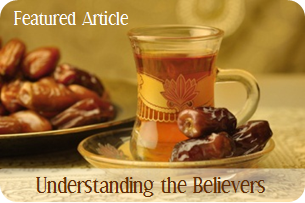


Reciting Durood on the Prophets in Salah
It is a common practice to recite durood (greetings, blessings and salutations) on the prophet during the "jalsa" or sitting down position in Salah. Almost the entire duration of this position of salah is spent on commemorating prophet Muhammed as well as Prophet Ibrahim. The duroods are recited in each salah, upto twenty-seven times a day in five daily prayers.

Quranic Reason to why it is Inappropriate to Dedicate any part of Salah to the Prophets
The Qur'an is a guide that regulates all practices and the ethics and ideas we carry must all be based from there. If a believer feels a practice violates an ethic or a principle of the Qur'an, he or she should find the courage to adjust that practice, but not necessarily annihilate the entire practice. How does a believer have Quranic criterion of judgement of his practices if he does not study the Qur'an directly? One first has to understand the Qur'an in order to judge everything he sees and does:
“Have you considered those who were asked to accept judgement from Allah’s Book? When they are asked to accept judgement from Allah’s Book, some of them turn their backs and walk away!” (Qur’an 3:23)
Therefore, we first have to establish the objective of salah from the Qur'an. Allah informs us that the purpose of salah is to remember Him alone - Allah explains why salah should be observed in one of the verses:
"Verily, I am Allah. There is no god but I: So serve Me (only), and establish salah for My remembrance (وَأَقِمِ الصَّلاةَ لِذِكْرِي) ." (Qur'an 20:14)
We are to serve only Him and salah is for, as Allah says, "My remembrance (only)" - to remember Allah alone. Allah further teaches us:
"Say, 'My prayers (salah) and sacrifice, my life and death are all for Allah, Lord of all the Worlds" (Qur'an 6:162)
In addition, indirectly, the verse "And the places of worship (Masjid) are for Allah (alone): So do not invoke anyone beside Allah." (Qur'an 72:18), further emphasises this point, since masjids are places where salah is performed.
Did the Prophet Recite the Durood in Salah?
So far we have discussed the major reason why it is Quranically incorrect to dedicate a portion of our salah to the Prophets - that we should perform salah to remember Allah only. However, if we analyse exactly how it is done today, we find that more things are in conflict with reasoning as well as Quranic verses.
The following is one of three duas recited in the sitting down position:
"Atthayyato Lillahe Wassalawato Wat Tayyebato. Assalamu Alaika Ayyohan Nabiyo Wa Rahmatullahi Wa Barakatoh. Assalamu Alaina Wa Ala ibadillahis Sualaiheen. Ashadu An La ilaah illal Laho Wa Ashadu Anna Mohammadan Abdohoo Wa Rasooluhoo."
The translation of the underlined section of the above du'a is:
"Peace be unto you oh Prophet, and His (Allah's) mercy and blessings on you".
Notice the wording of this greeting. It is a salutation addressed directly to the prophet himself.
This greeting is said in first person narrative. "Assalamu alaika" ("...unto you") is a second person address. This is a greeting you would use when someone is alive in front of you - exactly like the common greeting "Assalamu alaikum". You would never use this to refer to a another person who is not present.
Several issues arise here such as:
1) Where is the prophet?
2) Is he alive or dead and can he hear you if
he is dead?
3) Why is one saying it in their salah?
1) Where is the prophet?
The prophet is obviously not present
in front of us, then why is one greeting him as though he is in front
of him? Yet, who is meant to be in front of the worshipper? Allah or the Prophet? In Salah, Allah is meant to be symbolically in front of him, the Qur'an says to
establish Salah to serve Allah alone. Therefore, Allah instead of the prophet is in front of the worshipper.
2) Is he alive or dead and can he hear you if he is dead?
Let us suppose for arguments sake that the Prophet was
in front of the worshipper. The second issue is that he is no longer alive to listen to this greeting. His grave
is known worldwide to be located in the City of Medina in Saudi Arabia.
If one talks to a dead person, can the dead person hear?
Allah informs us in the Qur'an as follows:
"You cannot make the dead hear, you cannot make the deaf listen to your call when they turn their backs and leave." (Qur'an 27:80)
"The living and the dead are not the same. Allah makes anyone He wills hear, you cannot make those in their graves hear (وَمَآ أَنتَ بِمُسْمِعٍۢ مَّن فِى ٱلْقُبُورِ)." (Qur'an 35:22)
More details found here:
"The Dead cannot Hear nor Answer our Greetings"
Let alone sending a first-person greeting to another living being in salah when salah should not be for this purpose but for Allah's remembrance, one is doing it to a non-present, dead person who cannot hear according to the above verses. This does not mean that doing it to a living person lightens the severity, it is just that doing it to a non-living person adds another Quranic conceptual violation.
Some people have developed more conflicting ideas to fill in this gap between their practice and the Quranic teachings. They say that the Prophet is actually alive! Some even say that he is breathing in his grave. Are they trying to make such a point when the Qur'an says the prophet was a human being like us, "Say [Muhammed]: "Glory to my Lord! Am I any more than a human being - a messenger?" (17:93)? i.e. He was a messenger yet a human being subject to birth and death like ordinary human beings.
3) Why is one saying it in their salah?
Finally, the major conflict is that of the purpose of Salah. It is purely to celebrate Allah and
glorify His name alone.
Briefly, the Prophet is not in front of us while we perform salah. The prophet was a man, and in history, he is said to have died. He is neither in front of us, nor alive. Salah is meant to be for Allah:
"Verily, I am Allah. There is no god but I: So serve Me (only), and establish salah for My remembrance." (Qur'an 20:14)
It does not make sense for the Prophet to have recited the above durood on himself
It is commonly stated that we emulate the manner in which the prophet prayed - then could the prophet have recited that durood most recite today? It is highly paradoxical that the prophet would say "Peace be unto you oh prophet" (Assalamu Alaika Ayyohan Nabiy), in a second-person nerrative or "Oh Allah bless Muhammed" (Allahumma salli ala Muhammad) in a third person nerrative. We as individuals refer to ourselves as "I" or "Me". It is therefore, very improbable that the prophet recited any of those duas commonly recited today.
Therefore, to conclude from the Qur'an, the above reason as well because Allah says salah is for Him alone, and that the dead cannot hear, the entire Salah should be dedicated to remembering Allah. Everything to do with Allah and Allah alone. His greatness, Him being the sole provider of all our blessings. We may seek His help, explain our problems to feel lighter.
There are many duas which Allah teaches us in the Qur'an that are Allah-orientated. A few have been listed below:
رَبَّنَا لا تُزِغْ قُلُوبَنَا بَعْدَ إِذْ هَدَيْتَنَا وَهَبْ لَنَا مِنْ لَدُنْكَ رَحْمَةً إِنَّكَ أَنْتَ الْوَهَّابُ
Rabbana la tuzigh quloobana baAAda ith hadaytana wahab lana min ladunka rahmatan innaka anta alwahhab
"Our Lord, do not deviate our hearts after you have guided us. You are the Noble Giver." (Qur'an 3:8)
رَبَّنَا إِنَّنَا سَمِعْنَا مُنَادِيًا يُنَادِي لِلإِيمَانِ أَنْ آمِنُوا بِرَبِّكُمْ فَآمَنَّا رَبَّنَا فَاغْفِرْ لَنَا ذُنُوبَنَا وَكَفِّرْ عَنَّا سَيِّئَاتِنَا وَتَوَفَّنَا مَعَ الأَبْرَارِ
Rabbana innana samiAAna munadiyan yunadee lil-eemani an aminoo birabbikum faamanna rabbana faighfir lana thunoobana wakaffir AAanna sayyi-atina watawaffana maAAa al-abrar
"Our Lord! we have heard the call of one calling Us to Faith, 'Believe in your Lord,' and we have believed. Our Lord! Forgive us our sins, blot out from us our wrong actions, and make us die with the righteous." (Qur'an 3:193)
رَبَّنَا وَآتِنَا مَا وَعَدْتَنَا عَلَى رُسُلِكَ وَلا تُخْزِنَا يَوْمَ الْقِيَامَةِ إِنَّكَ لا تُخْلِفُ الْمِيعَادَ
Rabbana waatina ma waAAadtana AAala rusulika wala tukhzina yawma alqiyamati innaka la tukhlifu almeeAAad
"Our Lord, and grant us what You have promised through Your messengers, and do not embarrass us on the Day of Resurrection. You do not break the promise." (Qur'an 3:194)
رَبَّنَا لا تُؤَاخِذْنَا إِنْ نَسِينَا أَوْ أَخْطَأْنَا رَبَّنَا وَلا تَحْمِلْ عَلَيْنَا إِصْرًا كَمَا حَمَلْتَهُ عَلَى الَّذِينَ مِنْ قَبْلِنَا رَبَّنَا وَلا تُحَمِّلْنَا مَا لا طَاقَةَ لَنَا بِهِ وَاعْفُ عَنَّا وَاغْفِرْ لَنَا وَارْحَمْنَا أَنْتَ مَوْلانَا فَانْصُرْنَا عَلَى الْقَوْمِ الْكَافِرِين
Rabbana la tu-akhithna in naseena aw akhta/na rabbana wala tahmil AAalayna isran kama hamaltahu AAala allatheena min qablina rabbana wala tuhammilna ma la taqata lana bihi waoAAfu AAanna waighfir lana wairhamna anta mawlana faonsurna AAala alqawmi alkafireen
"Our Lord, do not take us to task if we forget or make mistakes. Lord, do not burden us with more than we have strength to bear. Pardon us, forgive us, and have mercy on us. Your are our protector, so help us against the disbelievers." (Qur'an 2:286)
رَبَّنَا آتِنَا فِي الدُّنْيَا حَسَنَةً وَفِي الآخِرَةِ حَسَنَةً وَقِنَا عَذَابَ النَّار
Rabbana atina fee alddunya hasanatan wafee al-akhirati hasanatan waqina AAathaba alnnar
"Our Lord, give us good in this world and good in the hereafter, and save us from the torment of the Fire." (Qur'an 2:201)
See also:
|
Do Plants, Animals & Insects Worship Allah? What Happens to them in the Hereafter? |

Copyright © , QuranicPath. All Rights Reserved.

